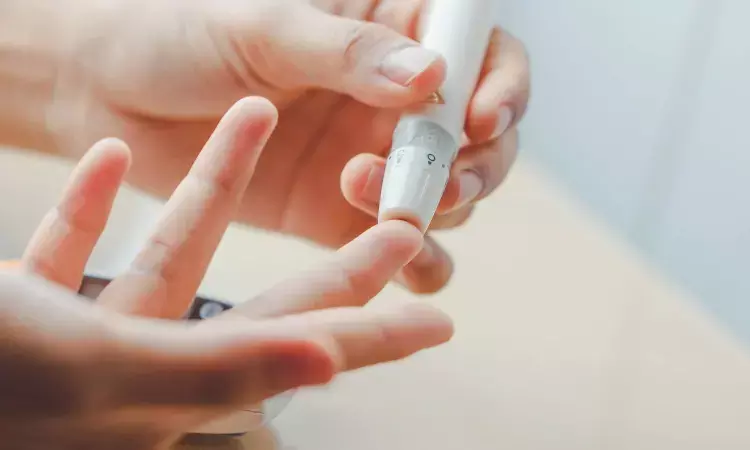- Home
- Medical news & Guidelines
- Anesthesiology
- Cardiology and CTVS
- Critical Care
- Dentistry
- Dermatology
- Diabetes and Endocrinology
- ENT
- Gastroenterology
- Medicine
- Nephrology
- Neurology
- Obstretics-Gynaecology
- Oncology
- Ophthalmology
- Orthopaedics
- Pediatrics-Neonatology
- Psychiatry
- Pulmonology
- Radiology
- Surgery
- Urology
- Laboratory Medicine
- Diet
- Nursing
- Paramedical
- Physiotherapy
- Health news
- Fact Check
- Bone Health Fact Check
- Brain Health Fact Check
- Cancer Related Fact Check
- Child Care Fact Check
- Dental and oral health fact check
- Diabetes and metabolic health fact check
- Diet and Nutrition Fact Check
- Eye and ENT Care Fact Check
- Fitness fact check
- Gut health fact check
- Heart health fact check
- Kidney health fact check
- Medical education fact check
- Men's health fact check
- Respiratory fact check
- Skin and hair care fact check
- Vaccine and Immunization fact check
- Women's health fact check
- AYUSH
- State News
- Andaman and Nicobar Islands
- Andhra Pradesh
- Arunachal Pradesh
- Assam
- Bihar
- Chandigarh
- Chattisgarh
- Dadra and Nagar Haveli
- Daman and Diu
- Delhi
- Goa
- Gujarat
- Haryana
- Himachal Pradesh
- Jammu & Kashmir
- Jharkhand
- Karnataka
- Kerala
- Ladakh
- Lakshadweep
- Madhya Pradesh
- Maharashtra
- Manipur
- Meghalaya
- Mizoram
- Nagaland
- Odisha
- Puducherry
- Punjab
- Rajasthan
- Sikkim
- Tamil Nadu
- Telangana
- Tripura
- Uttar Pradesh
- Uttrakhand
- West Bengal
- Medical Education
- Industry
Postoperative Hyperglycemia Affects Two-Thirds of Cardiac Surgery Patients, Linked to Higher Risk of Complications: Study

China: A new study has highlighted the significant impact of postoperative hyperglycemia (PHG) on clinical outcomes in patients undergoing cardiac surgery with cardiopulmonary bypass, revealing that this condition not only occurs frequently but also leads to a range of complications.
“Postoperative hyperglycemia (PHG) was observed in 65.3% of patients undergoing cardiopulmonary bypass and was significantly associated with a higher risk of several postoperative complications,” the researchers reported in Frontiers in Cardiovascular Medicine. Patients with PHG had increased rates of acute kidney injury (12.6% vs. 4.0%), delirium (9.5% vs. 3.4%), and pulmonary infections (12.0% vs. 5.1%) when compared to those without PHG.
The researchers further identified several independent risk factors for developing PHG, including pre-existing diabetes (odds ratio [OR] 13.1), pulmonary infection (OR 1.91), elevated intraoperative blood glucose levels (OR 1.51), and female sex (OR 1.38). In addition to heightened complication rates, patients with PHG also faced prolonged ICU stays and longer overall hospitalization.
Postoperative hyperglycemia is commonly observed following cardiac surgery involving cardiopulmonary bypass (CPB) and is associated with increased morbidity and mortality. Yuping Xiang, Department of Critical Care Medicine, West China Hospital, Sichuan University/West China School of Nursing, Sichuan University, Chengdu, Sichuan, China, and colleagues aimed to assess the incidence of PHG in such patients, identify its independent risk factors, and explore its impact on clinical outcomes.
For this purpose, the researchers conducted a retrospective observational study at West China Hospital of Sichuan University, analyzing patients who underwent cardiac surgery with cardiopulmonary bypass between January 2023 and March 2024. 1,008 consecutive patients admitted to the cardiac surgery ICU were categorized into PHG and non-PHG groups. Blood glucose levels were monitored immediately after surgery and every 3–4 hours daily for 10 days or until ICU discharge. Patients with PHG received intravenous insulin therapy.
Based on the study, the researchers reported the following findings:
- Postoperative hyperglycemia (PHG), defined as random blood glucose ≥180 mg/dL on two occasions within 24 hours, was observed in 65.28% of patients undergoing cardiac surgery.
- Older age was associated with a higher risk of PHG (OR 1.054).
- Female patients were more likely to develop PHG (OR 1.380).
- Diabetes was a strong predictor of PHG (OR 13.101).
- Pulmonary infection increased the risk of PHG (OR 1.918).
- Longer aortic cross-clamp time was linked to PHG (OR 1.007).
- Higher intraoperative glucose levels were independently associated with PHG (OR 1.515).
- Patients with PHG had a higher incidence of acute kidney injury compared to those without PHG (12.61% vs. 4.00%).
- The rate of delirium was higher in the PHG group (9.57% vs. 3.43%).
- Pulmonary infection occurred more frequently in PHG patients (12.01% vs. 5.14%).
- The duration of mechanical ventilation was longer in the PHG group (19 vs. 14 hours).
- The length of ICU stay was extended among PHG patients (74 vs. 58 hours).
- Hospital stay was also prolonged in PHG cases (13 vs. 11 days).
- Self-discharge or death was more common in PHG patients compared to non-PHG patients (3.95% vs. 0.57%).
The study revealed that postoperative hyperglycemia commonly occurs after cardiac surgery with cardiopulmonary bypass and is independently associated with risk factors like older age, female sex, diabetes, pulmonary infections, longer aortic cross-clamp time, and high intraoperative glucose levels. PHG is linked to poorer outcomes, including higher rates of kidney injury, delirium, infections, prolonged ventilation, extended ICU and hospital stays, and increased risk of self-discharge or death.
"These findings highlight the need for timely detection and effective management of PHG to enhance postoperative recovery," the authors concluded.
Reference:
Xiang, Y., Luo, T., & Zeng, L. (2025). Risk factors and clinical outcome of postoperative hyperglycemia after cardiac surgery with cardiopulmonary bypass. Frontiers in Cardiovascular Medicine, 12, 1479922. https://doi.org/10.3389/fcvm.2025.1479922
Dr Kamal Kant Kohli-MBBS, DTCD- a chest specialist with more than 30 years of practice and a flair for writing clinical articles, Dr Kamal Kant Kohli joined Medical Dialogues as a Chief Editor of Medical News. Besides writing articles, as an editor, he proofreads and verifies all the medical content published on Medical Dialogues including those coming from journals, studies,medical conferences,guidelines etc. Email: drkohli@medicaldialogues.in. Contact no. 011-43720751


